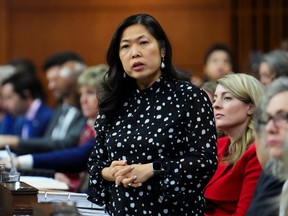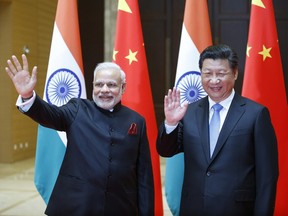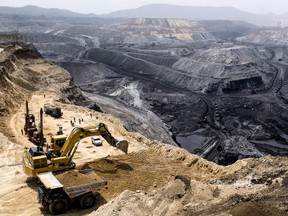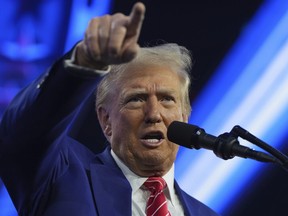Piyush Goyal says India open to Canadian miners exploiting its lithium deposits
Article content
Indian Commerce and Industry Minister Piyush Goyal said the south Asian nation is open to Canadian miners exploiting the country’s lithium deposits, an indication that critical minerals could form the basis of a renewed commercial relationship between Canada and one of the fastest growing economies in the world.
Advertisement 2
Article content
“I would very much like Canadian mining companies to join us,” Goyal said at a press conference in Toronto while wrapping up a three-day visit to Canada on May 10. “Mining companies from Canada must visit India. We will make sure to send them into meetings both at the government level and also with mining companies in India … and see how we can expand our own mining system.”
Article content
Goyal added that India would be happy to adopt the technologies that Canadian miners utilize.
Lithium is used to make batteries and other green devices, and securing supplies will be key to the transition away from energy derived from fossil fuels. Western nations such as Canada are scrambling to establish new supply lines to offset China’s influence over the production of green technology, prompting heightened engagement with some of China’s rivals for economic supremacy in Asia. Canada published its first Indo-Pacific Strategy in November.
Advertisement 3
Article content
In February, the Indian government said it had discovered 5.9 million tonnes of lithium in Jammu and Kashmir, a northern territory that borders Pakistan. This was the first time that the south Asian nation revealed an estimate for the metal. While India isn’t a traditional destination for Canadian miners, the country is expanding its search for minerals used in batteries and fertilizers.
The governments of Justin Trudeau and Narendra Modi revived stagnant talks on a trade agreement last year, and both sides indicated this week that a deal could be possible before the end of the year. Neither government has said specifically what industries would be covered, but Goyal’s invitation to Canadian miners suggests resources could be a part of any agreement.
Article content
Advertisement 4
Article content
‘Tremendous progress’
Business leaders hope that Goyal’s trip will speed the signing of an Early Progress Trade Agreement (EPTA) between the two nations, which would be a step towards the Comprehensive Economic Partnership Agreement (CEPA) that Canada eventually wants to sign.
Canada typically prefers trade agreements that cover most aspects of the economy. However, after making little headway with India after more than a decade of talks, Trudeau and Modi decided to try for a smaller pact based on areas where they could more easily find agreement. The two countries first began trade talks in 2010 under former prime minister Stephen Harper, but 10 rounds of talks over seven years failed to produce a breakthrough.
Advertisement 5
Article content
The situation is different now. Talks were resuscitated in March 2022 when Trade Minister Mary Ng visited India and the countries have since held seven rounds of discussion leading up to Goyal’s visit this week.
“We have made tremendous progress, but the nature of such agreements are always full of uncertainties,” Goyal said.

The minister refused to provide a deadline for when a deal is likely to be signed. But when asked if an agreement could come by the end of the year, he said that such a timeline was “certainly not beyond the realm of possibility.”
Goyal added: “I do wish it’s much faster than that.”
The ‘C-word’
Businesses in Canada don’t necessarily need a deal with India to invest there.
Canadian pension funds already have invested heavily in Indian infrastructure and Canadians overall have about $65 billion in portfolio investments in India. An agreement, however, provides reassurance to businesses. They know that there are a set of rules that both countries will follow.
Advertisement 6
Article content
Some Canadian businesses believe that an agreement with India could help expand trade and benefit the Canadian economy in the long run. But economists and analysts have also described India’s trade policy as defensive and protective, as it has refrained from opening its sectors to developed nations. However, its last few trade deals suggest a change in the mindset of Modi’s government.

China looms over any collaboration between India and allies of the United States, where President Joe Biden is leading an effort to counter Beijing’s growing influence. Canada this week expelled a Chinese diplomat who was accused of targeting Conservative member of Parliament Michael Chong’s family. India’s relationship with China is even touchier, as soldiers engaged in violent confrontations last year while patrolling disputed territory along their borders in the Himalayas.
Advertisement 7
Article content
When asked if Canada’s deteriorating relationship with China played any role in speeding up the agreement, Goyal’s response was diplomatic.
“The ‘C-word’ here is complementary and collaboration,” said the minister. “There may be other happenings around the ecosystem both in India and in Canada, but the partnership is an integral partnership between India and Canada, others are probably extras in the star cast.”
Natural trading partners
Goyal said there were very few areas — three or four agricultural items and one or two non-agricultural items — where India and Canada competed with each other, and that the two countries were otherwise “perfect collaborators.”
While the minister spoke about certain sectors such as critical minerals and agriculture that both Canada and India would want to collaborate on, he added that mentioning the sectors in the trade deal was not going to drive the success or failure of the negotiation.
Advertisement 8
Article content
Some sectors may be included specifically in the deal, but the major focus was going to be on trust, future growth and market demands, said Goyal.
-

Why Canada and India might finally sign a trade agreement
-

Trudeau’s $2.3-billion Asia strategy leaves room for China
-

Unlimited flights between India and Canada given green light
“It’s not about a sector, but very often there are certain areas of interest in which you do try to encourage a more liberal approach. And Mary Ng and I are taking that forward in that spirit of partnership,” he said.
• Email: nkarim@postmedia.com | Twitter: naimonthefield
• Email: shughes@postmedia.com | Twitter: StephHughes95
India minister invites Canada miners to join in critical minerals hunt
2023-05-11 13:45:58







Comments
Postmedia is committed to maintaining a lively but civil forum for discussion and encourage all readers to share their views on our articles. Comments may take up to an hour for moderation before appearing on the site. We ask you to keep your comments relevant and respectful. We have enabled email notifications—you will now receive an email if you receive a reply to your comment, there is an update to a comment thread you follow or if a user you follow comments. Visit our Community Guidelines for more information and details on how to adjust your email settings.
Join the Conversation